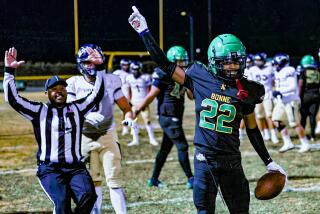NCAA Compounds Washington Penalties : College football: New sanctions would ban Huskies from television for 1994 season.
- Share via
The University of Washington football program, already under the thumb of Pacific 10 Conference sanctions, has been assessed additional penalties by the NCAA Committee on Infractions.
The latest sanctions, which were announced at a Friday afternoon news conference at the Seattle campus, would prevent the Huskies from appearing on television for another season, through 1994. The NCAA also added another year of probation to the original penalty, thus extending the time to the summer of 1996.
The committee’s decision caught Washington administrative and athletic department officials by surprise and prompted a vow to challenge the proposed NCAA penalties. An expedited hearing before the committee is scheduled June 5 in Kansas City.
“We’re emotionally very upset,” said Washington President William P. Gerberding, who was informed of the additional penalties in an April 27 letter sent by David Swank, chair of the NCAA Committee on Infractions. “I’m extremely upset and have been since I received the letter.”
At the heart of the dispute is a Los Angeles-based summer jobs program that employed numerous Washington players but often required them to do only minimal work. According to the committee, this constituted a lack of institutional control, most notably by “the athletics staff in general, and the football coaching staff in particular.” So disturbing was the problem, especially as it related to the jobs program in Los Angeles, that the committee added sanctions to the original Pac-10 penalties.
Gerberding said Friday that the university accepted the committee’s findings and acknowledged once more that the summer jobs program was poorly monitored. But in its official response to the committee, Gerberding wrote that the new punishment was “excessive.”
In what surely will be Washington’s argument against the increased punishment, Gerberding’s letter to the NCAA outlined a six-point defense statement. In short, the school said:
--The penalties affect “innocent” student athletes.
--The violations, while major in nature, were unintentional.
--This is Washington’s first NCAA football violation in 30 years.
--School officials, coaches and players have cooperated fully with all investigations.
--The university took immediate remedial actions.
--The NCAA penalties are inconsistent with those levied most recently against Auburn and Texas A&M;, two programs that Washington insists committed more grievous violations that the Huskies.
If nothing else, the penalties will have serious financial ramifications. The Pac-10 television sanctions already have cost Washington about $1.4 million in revenue, and Athletic Director Barbara Hedges warned that additional lost TV earnings would force her to make “adjustments” within the athletic department. The Huskies are scheduled to appear on ABC telecasts Sept. 3 at USC, Sept. 10 at Seattle against Ohio State and most likely Sept. 24 at Miami.
The Huskies appeared on five ABC regional telecasts last season, but were not allowed to collect fees for those appearances.
The Committee on Infractions report also appears to justify the Pac-10’s initial penalties, which put Washington on two years’ probation, banned the program from postseason appearances in 1993 and 1994, banned the team from 1993 television revenue and reduced the number of official recruiting visits and available scholarships.
Those penalties caused the abrupt resignation last August of Don James, the longtime Husky coach who said he could no longer work in a conference “that treats its players and coaches so unfairly.” As it turns out, Washington should have considered itself lucky.
“It seems like they’re shooting a dead horse,” Husky tight end Mark Bruner said of the NCAA sanctions. “We’ve already served half our time. No matter what the hell they do or what they say, they’re not going to stop us. The only way we’re going to be defeated is if the Huskies defeat themselves.”
This isn’t the first time the NCAA has added penalties to conference sanctions in major cases. As recently as March, the committee imposed additional probation to the Washington State track and baseball teams.
Times correspondent Sam Farmer contributed to this story from Seattle.
More to Read
Go beyond the scoreboard
Get the latest on L.A.'s teams in the daily Sports Report newsletter.
You may occasionally receive promotional content from the Los Angeles Times.










